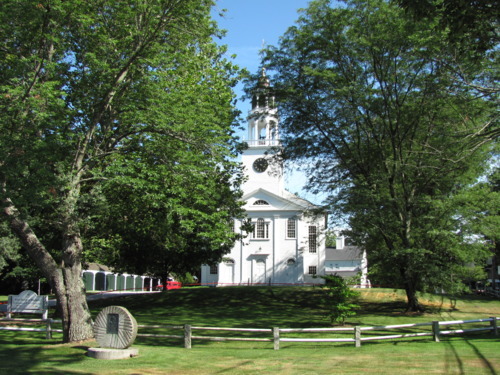
Today’s reading finds me in possession of facts with which I will dispute Marshall McCluhan.
First, some personal background. My parents grew up in Sudbury, Massachusetts, a western suburb of Boston, and by the time I entered second grade, our branch of the family had migrated over the river to Wayland. We worshipped at the First Parish Unitarian Church (in photo above) at the center of town. So I grew up in a suburb. My Dad commuted on the train to his office in Boston’s financial district. My Mom was co-leader of a Cub Scout Pack. My first newspaper job, at about age 8, was editor and deliverer of The Claypit Flyer, the neighborhood newspaper that I printed in purple ink on a hectograph. In an early editorial, I lambasted Teddy Kennedy for cheating at Harvard. I was a Republican then. I know suburbs.
That is why I bristled this morning when I read the following inUnderstanding Media at page 180:
With the coming of the horse-drawn bus and streetcar, American towns developed housing that was no longer within sight of shop or factory. The railroad next took over the development of the suburbs, with housing kept within walking distance of the railroad stop. Shops and hotels around the railroad gave some concentration and form to the suburb.
Sudbury was incorporated in 1639, and Wayland was Sudbury’s first settlement, also in 1639. I can’t find any specific information about the role of the horse-drawn bus and streetcar in the history of New England, but I doubt they were key determinants of where people built homes in the 1600s. I know for a fact that the housing in Wayland was not kept within walking distance of railroad stops. Shops and hotels around the railroad giving concentration and form? Not in Sudbury or Wayland. Their concentration and form were established long before the railroad.
I wonder if a problem with McLuhan’s writing frequently resides in his sweeping generalizations. In three sentences, he attempts to describe the development of all American towns. It sounds plausible, until you test the generalization against something you know personally. Maybe his description would better describe American suburbs outside of New England. Maybe if he had consulted archives of The Claypit Flyer, he would have written a more nuanced account of American towns.
Thus endeth the dispute.
It leaves me no less eager to continue my investigation. The centenary of MM’s birth arrives in just two days!
 Send to Kindle
Send to Kindle